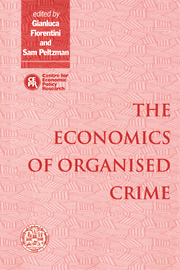Book contents
- Frontmatter
- Contents
- List of figures
- List of tables
- Foreword
- Acknowledgements
- List of conference participants
- 1 Introduction
- PART I THEORIES OF THE STATE AND THE ORIGIN OF CRIMINAL ORGANISATIONS
- PART II THE CRIMINAL ORGANISATION AS A FIRM
- PART III ORGANISED CRIME AND STATE INTERVENTION IN THE ECONOMY
- 6 Rival kleptocrats: the mafia versus the state
- Discussion
- 7 Corruption: arm's-length relationships and markets
- Discussion
- PART IV DETERRENCE POLICIES AGAINST LEGAL FIRMS INVOLVED IN ILLEGAL ACTIVITIES
- PART V DETERRENCE POLICIES AGAINST ORGANISED CRIME
- Index
7 - Corruption: arm's-length relationships and markets
Published online by Cambridge University Press: 04 August 2010
- Frontmatter
- Contents
- List of figures
- List of tables
- Foreword
- Acknowledgements
- List of conference participants
- 1 Introduction
- PART I THEORIES OF THE STATE AND THE ORIGIN OF CRIMINAL ORGANISATIONS
- PART II THE CRIMINAL ORGANISATION AS A FIRM
- PART III ORGANISED CRIME AND STATE INTERVENTION IN THE ECONOMY
- 6 Rival kleptocrats: the mafia versus the state
- Discussion
- 7 Corruption: arm's-length relationships and markets
- Discussion
- PART IV DETERRENCE POLICIES AGAINST LEGAL FIRMS INVOLVED IN ILLEGAL ACTIVITIES
- PART V DETERRENCE POLICIES AGAINST ORGANISED CRIME
- Index
Summary
Introduction
On 8 May 1993 The Washington Post carried a front-page story about a division of the US National Institute of Health in Bethesda ‘in which some female employees were promised promotions and raises if they agreed to have sex with their male managers …’ (Jennings, 1993, p. 1). On the same day, an article in The New York Times reported that in China, in the process of privatisation of land, ‘individuals seem to be expropriating the state's property at bargain prices.’ (Dunn, 1993, p. 3). The article goes on to state that ‘… today's real estate boom raises troubling questions about land that is allocated not [so much] by prices but by guanxi. The deals … say less about market economics than about simple corruption’ (ibid.). Guanxi is the Chinese word for ‘connections’. The article cites a Chinese businessman to the effect that: ‘if you have guanxi, it is the time to make big money.’ Thus, according to this article, in today's China, ‘connections’ have great economic value and smart people can capitalise on them to earn large ‘incomes’. On 8 May 1993 French newspapers were still carrying stories about the suicide of former Prime Minister Pierre Beregovoy, attributed in part to the accusation that he had received an interest-free loan from a friend. And Italian newspapers were providing further details about private entrepreneurs who had paid large bribes to well-placed politicians in order to get lucrative contracts with the Italian public sector.
- Type
- Chapter
- Information
- The Economics of Organised Crime , pp. 161 - 180Publisher: Cambridge University PressPrint publication year: 1996
- 19
- Cited by



